Eddie Polo (1875–1961) was an Austro-American actor of the silent era. His nickname was 'Hercules of the Screen'. Polo played adventurers and cowboys in American serials and films. During the late 1920s, he was a popular action star in the German silent cinema.
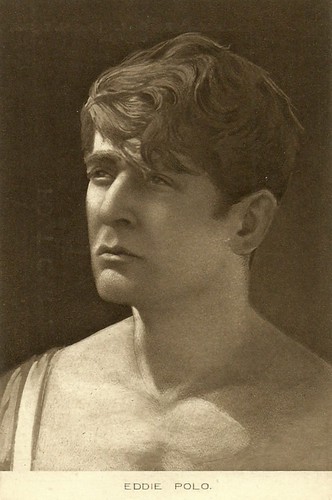
British postcard. Photo: Trans-Atlantic Film Co. Ltd. In the 1910s Trans-Atlantic was the European distributor for Universal.
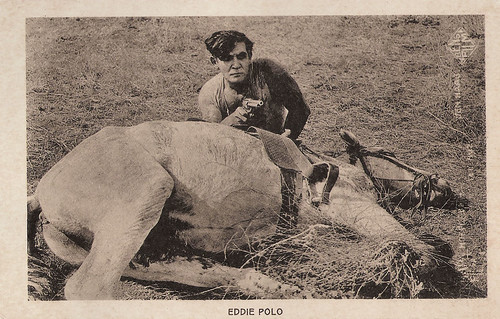
Dutch postcard by HAP Film, Den Haag. Photo: BenS Film.
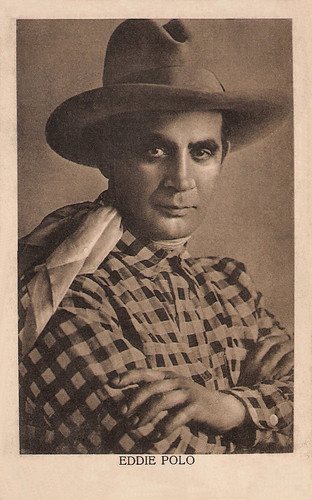
German postcard by Filmhaus Bruckmann & Co. Aktiengesellschaft, Frankfurt a./Main.
Eddie Polo was born Edward W. Wyman or Weimer in Vienna, Austria-Hungary. His brother was the acrobat, actor and makeup artist Sam Polo. Eddie was the catchman in the trapeze act The Flying Cordovas with his brother. He was the first man to parachute off the Eiffel Tower, and he later set an altitude record for parachuting from a plane.
Polo moved to the USA. In 1913, he started his film career as a stuntman at Universal. Studio head Carl Laemmle spotted the beefy novice at work and had him cast opposite serial queen Grace Cunard in the adventure-mystery serial The Broken Coin (Francis Ford, 1915).
Polo quickly shot to serial stardom himself, billed (reportedly at his insistence) as 'The Hercules of the Screen' in such epics as The Gray Ghost (Stuart Paton, 1917). Like most serials they were short on plot and long on action, with Polo always doing his own spectacular stunts.
As Cyclone Smith, he became a popular Western hero in s film series that started with A Prisoner for Life (John Francis Dillon, 1919) with Eileen Sedgwick as Cyclone's wife. He directed himself in The Vanishing Dagger (Eddie Polo, 1920).
In 1925 he quit Universal and formed his own production company, ignoring the fact that he was the oldest action star in Hollywood and that his popularity was plummeting. His self-produced films were flops.
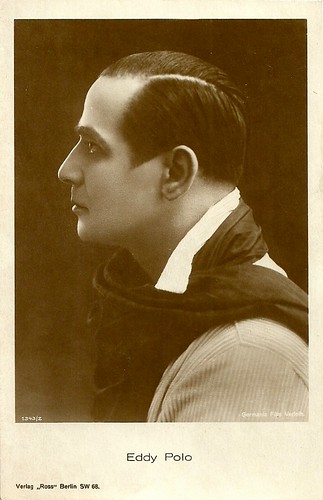
German postcard by Ross Verlag, no. 1343/2, 1927-1928. Photo: Germania Film Verleih.
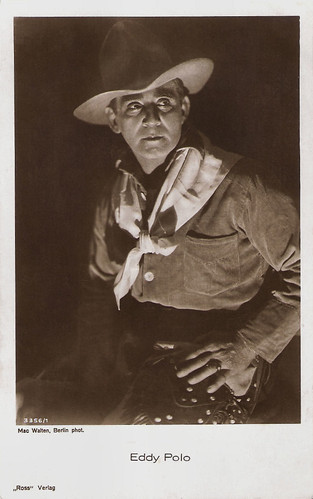
German postcard by Ross Verlag, no. 3356/1, 1928-1929. Photo: Mac Walten, Berlin.
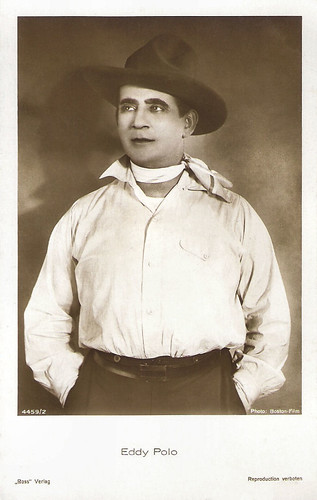
German postcard by Ross Verlag, no. 4469/2, 1929-1930. Photo: Boston Film.
During the late 1920s, Eddie Polo was an action star in the German silent cinema. His German career started with Die Eule - 1. Die tollen Launen eines Millionärs/The Owl - 1. The mad whims of a millionaire (Eddie Polo, 1927) with Erich Kaiser-Titz and Hans Adalbert Schlettow.
One of his best known German films is the adventure film Auf der Reeperbahn nachts um halb eins/On the Reeperbahn at Half Past Midnight (Fred Stranz, 1929) with Lydia Potechina. The film takes its name from the 1912 song of the same name, which refers to the Reeperbahn in Hamburg. The film was made by the German subsidiary of the Hollywood studio Universal Pictures.
Also interesting is the silent thriller Der Teufelsreporter/The Daredevil Reporter (Ernst Laemmle, 1929) with Gritta Ley and Maria Forescu. It was the first credited screenplay by Billy Wilder.
His acting career as a leading man ended with the coming of sound. During the sound era, he appeared with another action star of the silent cinema, Luciano Albertini, in supporting roles in the comedy thriller Es geht um alles/All is at Stake (Max Nosseck, 1932), starring Claire Rommer and Ernő Verebes. The roles became smaller and smaller and his final film appearance was an uncredited bit part as a waiter in Two Sisters from Boston (Henry Koster, 1946) with Kathryn Grayson and June Allyson.
Bobb Edwards at Find a Grave: "Largely unemployed after the 1930s, but with his ego undiminished, Polo spent his last years trying to get a movie made of his life story." After his acting career ended, Polo worked as a makeup artist. In 1961, he died from a heart attack while dining in a restaurant in Hollywood, California .
Eddie Polo was married to Alice Finch and to Pearl Grant. He was the father of actress Malvina Polo (1903-2000), best remembered as the mentally handicapped girl preyed upon for rape in Erich von Stroheim's Foolish Wives (1922).
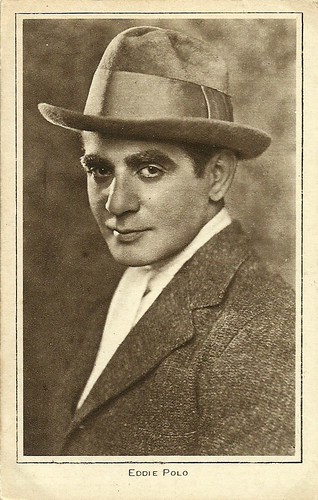
British postcard in the Pictures" Portrait Gallery by Pictures Ltd., London, no. 155.
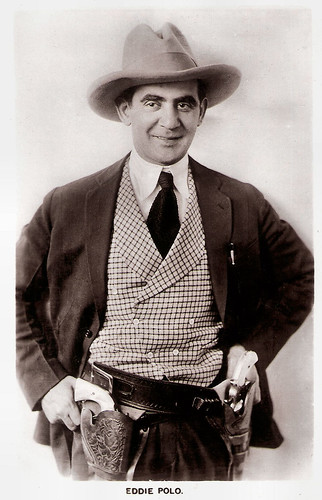
British postcard in the Picturegoer Series, London, no. 162.
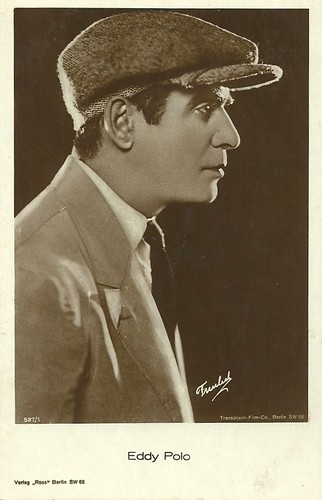
German postcard by Ross Verlag, no. 5871/1. Photo: Transocean-Film Co., Berlin / Freulich.
Sources: Bobb Edwards (Finda Grave), Thomas Staedeli (Cyranos), Wikipedia and IMDb.

British postcard. Photo: Trans-Atlantic Film Co. Ltd. In the 1910s Trans-Atlantic was the European distributor for Universal.

Dutch postcard by HAP Film, Den Haag. Photo: BenS Film.

German postcard by Filmhaus Bruckmann & Co. Aktiengesellschaft, Frankfurt a./Main.
Parachuting off the Eiffel Tower
Eddie Polo was born Edward W. Wyman or Weimer in Vienna, Austria-Hungary. His brother was the acrobat, actor and makeup artist Sam Polo. Eddie was the catchman in the trapeze act The Flying Cordovas with his brother. He was the first man to parachute off the Eiffel Tower, and he later set an altitude record for parachuting from a plane.
Polo moved to the USA. In 1913, he started his film career as a stuntman at Universal. Studio head Carl Laemmle spotted the beefy novice at work and had him cast opposite serial queen Grace Cunard in the adventure-mystery serial The Broken Coin (Francis Ford, 1915).
Polo quickly shot to serial stardom himself, billed (reportedly at his insistence) as 'The Hercules of the Screen' in such epics as The Gray Ghost (Stuart Paton, 1917). Like most serials they were short on plot and long on action, with Polo always doing his own spectacular stunts.
As Cyclone Smith, he became a popular Western hero in s film series that started with A Prisoner for Life (John Francis Dillon, 1919) with Eileen Sedgwick as Cyclone's wife. He directed himself in The Vanishing Dagger (Eddie Polo, 1920).
In 1925 he quit Universal and formed his own production company, ignoring the fact that he was the oldest action star in Hollywood and that his popularity was plummeting. His self-produced films were flops.

German postcard by Ross Verlag, no. 1343/2, 1927-1928. Photo: Germania Film Verleih.

German postcard by Ross Verlag, no. 3356/1, 1928-1929. Photo: Mac Walten, Berlin.

German postcard by Ross Verlag, no. 4469/2, 1929-1930. Photo: Boston Film.
Popular in Germany
During the late 1920s, Eddie Polo was an action star in the German silent cinema. His German career started with Die Eule - 1. Die tollen Launen eines Millionärs/The Owl - 1. The mad whims of a millionaire (Eddie Polo, 1927) with Erich Kaiser-Titz and Hans Adalbert Schlettow.
One of his best known German films is the adventure film Auf der Reeperbahn nachts um halb eins/On the Reeperbahn at Half Past Midnight (Fred Stranz, 1929) with Lydia Potechina. The film takes its name from the 1912 song of the same name, which refers to the Reeperbahn in Hamburg. The film was made by the German subsidiary of the Hollywood studio Universal Pictures.
Also interesting is the silent thriller Der Teufelsreporter/The Daredevil Reporter (Ernst Laemmle, 1929) with Gritta Ley and Maria Forescu. It was the first credited screenplay by Billy Wilder.
His acting career as a leading man ended with the coming of sound. During the sound era, he appeared with another action star of the silent cinema, Luciano Albertini, in supporting roles in the comedy thriller Es geht um alles/All is at Stake (Max Nosseck, 1932), starring Claire Rommer and Ernő Verebes. The roles became smaller and smaller and his final film appearance was an uncredited bit part as a waiter in Two Sisters from Boston (Henry Koster, 1946) with Kathryn Grayson and June Allyson.
Bobb Edwards at Find a Grave: "Largely unemployed after the 1930s, but with his ego undiminished, Polo spent his last years trying to get a movie made of his life story." After his acting career ended, Polo worked as a makeup artist. In 1961, he died from a heart attack while dining in a restaurant in Hollywood, California .
Eddie Polo was married to Alice Finch and to Pearl Grant. He was the father of actress Malvina Polo (1903-2000), best remembered as the mentally handicapped girl preyed upon for rape in Erich von Stroheim's Foolish Wives (1922).

British postcard in the Pictures" Portrait Gallery by Pictures Ltd., London, no. 155.

British postcard in the Picturegoer Series, London, no. 162.

German postcard by Ross Verlag, no. 5871/1. Photo: Transocean-Film Co., Berlin / Freulich.
Sources: Bobb Edwards (Finda Grave), Thomas Staedeli (Cyranos), Wikipedia and IMDb.
No comments:
Post a Comment